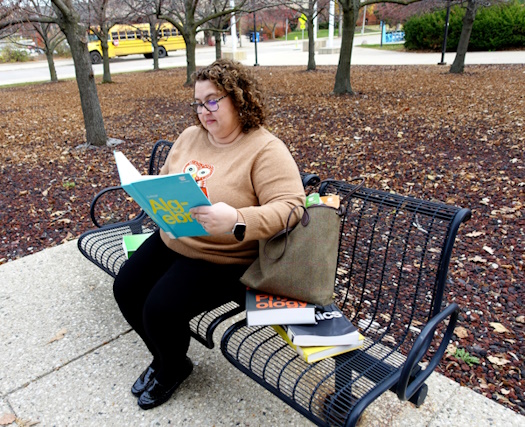
Kristin Woodward is the UWM Libraries’ Teaching and Learning Team lead and heads the Libraries’ efforts on Open Education Resources (OER). In this latter role, Kristin and colleagues in UWM’s Center for Excellence and Teaching (CETL), through their support of open textbooks, have helped 35,000 UWM students save a total of more than $4 million since 2016.
Kristin received her undergraduate degree in English from UW-Madison and her master’s degree in library and information science from UWM. Her first professional librarian position was at Carroll University, followed by jobs at Cardinal Stritch University and then the UWM Libraries, where she worked in interim and parttime roles. She was appointed to a fulltime permanent position as instructional design librarian in 2006.
Q: What does the Teaching and Learning Team do?
Kristin: We are responsible for information literacy integration in the UWM curriculum, so we think about all the classes that are available at UWM and all of the different ways that the faculty build research and writing into those classes intentionally. We are there to support the work they are doing by introducing students to the Libraries’ tools but also the ways of thinking about how to use information and how to approach it.
Q: What tools does the Team provide?
Kristin: Heidi Anoszko, our instructional designer, creates tutorials — “digital learning objects” — that function as accessible and adaptable building blocks for students to use as they research and write their class projects. Claire Dinkelman focuses on student success, particularly in the larger instructional groups such as UWM’s research and writing composition program (English 101 and 102), helping instructors incorporate the learning objects into their lesson plans. Music and Performing Arts Librarian Anna Grau Schmidt, the third member of our team, offers a subject librarian’s perspective on information literacy strategies.
Q: Working with CETL, you have been instrumental in bringing open textbooks —textbooks that are published under an open license and available online for free — to UWM.
Kristin: I really thought that open textbooks had a place at UWM because we were trying as a university to reach students who were learning online, we were trying to give working adults truly good options for learning. We also knew that many students were not purchasing textbooks because of the expense. I thought that this was a gap that needed to be filled. That’s when we started to promote open textbooks to faculty.
Q: Your efforts have clearly been successful.
Kristin: It depends on how we measure success. We’ve had some really nice adoptions—Psychology 101 and 102, for example — that have shown that it’s possible when done intentionally that we can convert a class from a traditional textbook to an open Creative Commons-licensed textbook, still written by experts, still peer-reviewed, still offering a lot of attributes that faculty appreciate in textbooks.
Q: But there is more to be done?
Kristin: We have wanted to engage more faculty and make the adoption of OER a bigger, more present part of what faculty are thinking about when they prepare their classes. One of the ways that we have done that is by developing an online self-paced training that is just about OER, open textbooks, and library e-resources. That has been our focus for building some scale into the project.
Q: How do your roles at the Libraries impact student success?
Kristin: As information literacy instructors, we give students the building blocks to successfully find and cite the sources needed to complete their research assignments. The main impact of OER is that students can have the course material that they need at the beginning and throughout the course.
Q: What do you like most about your job?
Kristin: There are plenty of things that I like about my position–working with the people that we have here at UWM, working with our students. And I like learning something new every day. But I really appreciate that there is room to do creative problem solving and room to develop new ideas in terms of programming, and that’s always been very important to me.